The Adventure, Explanation, Line by Line, Meaning of Difficult Words, English CBSE Class 11 NCERT Hornbill Chapter 7
THE ADVENTURE
(Explanation and Meaning of difficult words)
Author – Jayant Narlikar


| Blow by blow account | A detailed description of an event |
| Morale booster | Motivation, Feeling more confident |
| Relegated to | Moved to lower position, Exiled |
| Political acumen | Political wisdom, Cleverness, Judgement |
| De facto | In realty, Actually |
| Astute | Clever, Shrewd |
| Doctored account | Manipulated details, Incorrectly written details |
| Gave vent to | Expressed one’s emotions |


The Jijamata Express train was running from Pune to Bombay route. It was running faster than Deccan Queen train. Outside Pune there were no factories or other buildings for industry.


| Word | Meaning |
| Ghat Section | Hilly region |
| Briefly | For a short time |
After 40 minutes the train reached its first stop Lonavala. The hilly part of this journey after Lonavala was known to him. The train stopped at Karjat for a short time. Then it started travelling at greater speed. The train crossed Kalyan station at a good speed.


| Word | Meaning |
| Meanwhile | In the meantime, During the same time |
| Racing mind | Thinking quickly |
| Historian | One who is expert in history |
In the meantime Mr Gaitonde had decided his plan of activities in Bombay. In fact he realised that he should have decided it earlier. After all he was a historian.
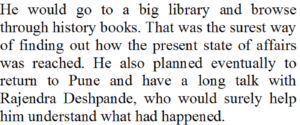

| Word | Meaning |
| Browse | Go through, Look into |
| Surest | Certain, Definite |
| Eventually | Finally |
He planned to go to a library and read books of history. This way he would certainly find out how the present condition was reached. He also planned to finally return to Pune. He wanted to have a long discussion with Rajendra Deshpande. He would surely help Mr. Goitonde in understanding what had happened.


He made this plan on the assumption that Mr. Rajendra Deshpande was alive and living in Pune. The train stopped just after the long tunnel.
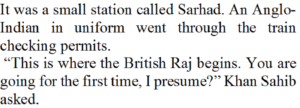

| Word | Meaning |
| Permit | Ticket |
| Presume | Assume |
The train had stopped at a small station named Sarhad. An Anglo-Indian official entered the compartment of the train. He stared checking tickets of passengers.
Khan Sahib said that from this point rule of Britain had started. He asked if Mr Goitonde was going to Bombay for the first time.


| Word | Meaning |
| Factually | As per facts |
| Ventured | Asked |
Mr. Goitonde replied affirmatively. Gangadharpant had never come to Bombay of this era. Gangadharpant is name of Mr. Goitonde. He asked Khan Sahib how would he go to Peshwar.
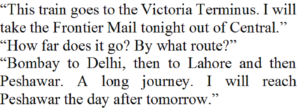

Khan Sahib replied that this train goes upto Victoria Terminus. He will get down there. He will catch another train Frontier Mail from Bombay Central station. Mr. Goitonde asked upto what station that train would go. Khan Sahib replied that it goes to Delhi, then to Lahore and finally to Peshwar. It is a long journey. I will reach there after two days.


| Word | Meaning |
| Thereafter | After that |
| Willing | Having the desire, Ready |
| Flavour of life | Idea about life |
After that Khan Sahib talked a lot about his business. Gangadharpant readily and eagerly listened to his talks. This way Goitonde was able to get some idea about the life in India of this era. This life was very much different from that of earlier times.


| Word | Meaning |
| Carriage | Coach, Compartment of a train |
The train was now passing through the suburban area of Bombay. Local trains were also running. Coaches of these train were of blue colour. GBMR was written on each coach.


| Word | Meaning |
| Union jack | National flag of England |
Khan Sahib spoke the full form GBMR – Greater Bombay Metropolitan Railway. He further said that a small national flag of England was painted on each coach. It is a polite reminder that we are in the area ruled by England.
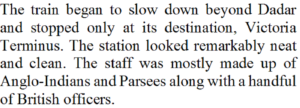

Speed of the train started reducing after Dadar. The train stopped at its last station of Victoria Terminus. This station was looking very neat and clean. Most of the officials at the railway station were either Anglo-Indians or Parsees. There were some officials of Britain also.




| Word | Meaning |
| Imposing | Very big, Impressive, Grand |
| Proclaimed | Announced |
| Identity | Name |
When Gangadharpant came out of the Victoria Terminus railway station , he saw a very big and impressive building. Its name was written on it. So those who did not know about it could also know its name. EAST INDIA HOUSE HEADQUARTERS OF THE EAST INDIA COMPANY
It was the main office of East India Company.


| Word | Meaning |
| Shocks | Surprises |
| Wound up | Closed |
| Shortly | After a brief time |
Professor Gaitonde had expected many surprises. But he did not expect to see this name to be written on any building. Because the books of history narrated that East India Company had closed after events of 1857.


| Word | Meaning |
| Alive | Existing |
| Flourishing | Popular |
| Taken a different turn | Had changed in a different manner |
Inspite of that the name of the building existed and was popular as well. He thought probably situations were different before 1857. He wanted to find out about it.
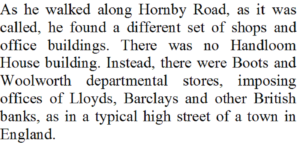

| Word | Meaning |
| High street | Main street or main road |
While walking along the Hornby Road, he saw different types of shops and buildings. He did not see Handloom House. But he saw various offices, shops and buildings that had British names. It looked as if it was a popular main road in a town of England.


He turned right from the Home Street and then entered into Forbes Building. The receptionist was a lady for England. He told receptionist that he wanted to meet Mr. Vinay Gaitonde.
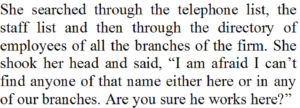

The lady receptionist searched the telephone list and list of employees working at other branches. She could not find the name in any of the lists. She shook her head and informed Professor Gaitonde that Mr. Vinay Gaitonde did not work in their organization. She advised him to confirm if Mr. Vinay Gaitonde really worked there.


| Word | Meaning |
| Blow | Shock ,Shocking information |
This information was not unexpected. Professor Gaitonde was dead for this world. There was no guarantee that his son would still be alive. His son might not have been born at this time.
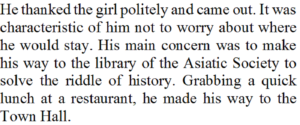

| Word | Meaning |
| Characteristic | Habit, Special quality |
| Concern | Worry |
| Riddle | Puzzle |
| Grabbing a quick lunch | Eating lunch quickly |
He thanked the lady receptionist and came out of the building. He had a habit of not to worry about his stay arrangements. His main desire was to go to library of Asiatic Society. He wanted to solve the puzzle of the history. He quickly ate his lunch in a restaurant. Then he started going towards Town Hall.
_____


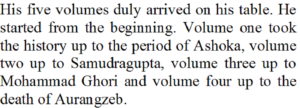

The five books of history written by him were on his table. The first book narrated history upto Ashoka, the second upto Smaudragupta, the third upto Mohammad Ghori and the fourth book upto the death of Aurangzeb.


Upto this period there was no change in the events. The change in the events had clearly happened during the period of last and fifth volume of the book.


| Word | Meaning |
| Converge | Meet, Coincide , Connect |
Gangadharpant started reading the book from both ends. Meaning that he read some pages from the beginning and then some pages from the end. He continued doing this. Soon he reached a point in the book from where the change in the events had started to occur.
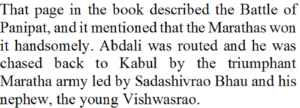

| Word | Meaning |
| Handsomely | Easily, Comfortable |
| Routed | Defeated |
On that page Battle of Panipat was described. It was written that Maratha had easily won that battle. Abdali was defeated. He was forced to run away to Kabul by the victorious Maratha army. The Maratha army was led by Sadashivrao Bhau and his young nephew Vishwasrao
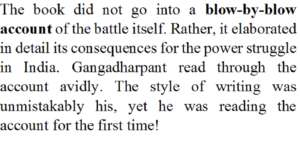

| Word | Meaning |
| Blow by blow account | A detailed description of an event |
| Consequence | Effect, Outcome, |
| Avidly | With great interest, Enthusiastically |
The book did not give a detailed description of the battle. It explained the outcome and effect of the struggle of power in India. He read the description with great interest. The style of writing was certainly his. Meaning that he had written the book. But he was reading the book for the first time.
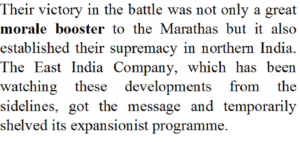

| Word | Meaning |
| Morale booster | Motivation, Feeling more confident |
| Supremacy | Being more powerful |
| Shelved | Postponed |
The victory in this battle motivated Marathas to a great extent. They became more confident. It established that they were more powerful even in the northern India. The East India Company was observing these developments without participating in any activity. They also understood the power of Marathas. They postponed their plan of expansion in India for some time.
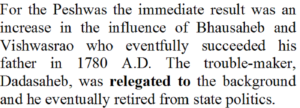

| Word | Meaning |
| Eventually | At last, Finally |
| Succeeded | Took over the throne, Take the position |
| Relegated | Moved to lower position, Exiled |
Owing to this victory by Peshwas, influence of Bhausaheb and Vishwasrao increased. After death of his father Vishwasrao finally became the Peshwa in 1780 AD . Dadasaheb was the troublemaker for him. He was moved to a lower position. Finally Dadasaheb retired from the politics of the state.
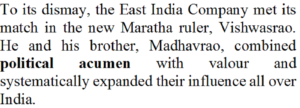

| Word | Meaning |
| Dismay | Unliking, Discomfort |
| Political acumen | Political wisdom, Cleverness, Judgement |
| Valour | Bravery |
Viswasrao was as strong as East India Company. Thus the company did not like him. He and his brother were brave as well as politically clever. Therefore they increased their influence to all over India.


| Word | Meaning |
| Pockets | Small areas |
| Rival | Opponent |
The influence of the East India Company was reduced to small areas near Bombay, Calcutta and Madras. This was similar to their opponent European companies from Portugal and France.
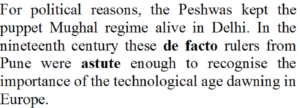

| Word | Meaning |
| Regime | Kingdom |
| De facto | In realty, Actually |
| Astute | Clever, Shrewd, Intelligent |
| Dawning | Starting |
Peshwas kept the Mughal empire in Delhi alive due to some political reasons. They were the real owners during nineteenth century. Pune was their capital. They were quite clever to accept that technological developments were taking place in Europe.


| Word | Meaning |
| Set up | Established |
Peshwas established their own centres for science and technology. East India Company thought this was an opportunity for them to do business and increase their influence. Assistance from the Company was accepted. The objective was to make Indian centres function on their own.


| Word | Meaning |
| Further | Additional |
| Inspired by | Motivated by, |
During twentieth century many more changes occurred in India. These changes were motivated by the changes happening in western part of the world. Democracy started getting foothold in India also. By that time Peshwas had lost major part of their empire. They were slowly replaced by the institutions that were elected through the process of democracy.
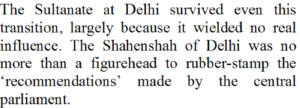

| Word | Meaning |
| Sultanate | Kingdom, Empire |
| Transition | Period of change |
| Largely | Mainly |
| Wielded | Exhibited, Exercised, Possessed |
| Shahenshah | Emperor |
| Figurehead | High authority without powers |
| Rubber stamp | Authority that follows order of others |
The kingdom at Delhi somehow survived even during this period of change. It was mainly because it did not have any authority now. The emperor of Delhi was a powerless person now. He had to obey the orders issued by others. These orders were given in the name of recommendations by the central parliament.


| Word | Meaning |
| Appreciate | Understand |
| Stand on its feet | To be independent, Self reliant |
Gangadharpant continued to read. He started understanding the India he had seen. In this country white people – people of Europe – had not made Indians their slaves. India was self sufficient and people had respect for themselves.


| Word | Meaning |
| Commercial | Related to business |
| Outpost | A small office away from main area |
| Lease | To give on rent for a specified period |
| Treaty | Agreement normally between two groups |
India was strong and for the business purpose, it had allowed the British to occupy Mumbai. It was considered to be a small office for them that was away from the main area of the country. The agreement for the renting Mumbai was upto the year 2001. The agreement was signed in 1908.


| Word | Meaning |
| Could not help comparing | Compared intentionally |
Gangadharpant compared the country he knew with the country he was now seeing around him.


| Word | Meaning |
| Investigations | Findings, Examination, Inspection |
| Look for | Search |
| Accounts of battle | Details of battle |
Simultaneously he felt that his examination and inspection were yet to be completed. He wanted to know how Marathas won the battle. To find the answer to his question he had to search details of the battle.


| Word | Meaning |
| Clue | Hint |
He studied the book and journals that were lying infront of him. Finally one of the books gave him a hint. Name of the book was Bhausahebanchi Bakhar.


| Word | Meaning |
| Relied | Believed |
| Seldom | On very few occasions |
| Evidence | Proof, Description |
| Burried | Hidden |
| Doctored account | Manipulated details, Incorrectly written details |
He believed the Bakhars on very few occasions to obtain proofs of history. But it was interesting to read these books. Sometimes facts were hidden behind the diagrams and manipulated details.


He found the truth in detail given in three lines. It said that Vishwasrao was nearly killed in the battle.


| Word | Meaning |
| Melee | Crowd, |
| Elite | Best, Special |
At that situation Vishwasrao guided his horse into the crowd of special soldiers of enemy. They all attached him. God certainly showed mercy on him. A bullet moved very close to his ears. Gap between the bullet and his head was very small. He could have been killed.


| Word | Meaning |
| Emerged | Came out of |
At 8 PM, the librarian politely told Gangadharpant that it was the time to close the library. Gangadharpant stopped thinking. He looked around. He noticed that he was the only person in the big hall of library.


| Word | Meaning |
| I beg you pardon | Excuse me , It is a way of drawing attention |
Gangadharpant requested the librarian to keep those books on the table itself. He wanted to read these next morning. He asked the librarian about the opening time of the library.


The librarian replied that library opens at 8 in the morning. He liked the reader and the researcher.


| Word | Meaning |
| Shoved | Put forcibly, Put crudely |
| Absentmindedly | Unintentionally |
While getting up from the table the professor pushed his notes into his right pocket. By mistake he also put the Bakhar into his left pocket.
____


| Word | Meaning |
| Frugal | Cheap, Costing less |
| Set out | Start |
| Stroll | Walk leisurely |
The professor did not spend much money on buying his food. After dinner he started walking towards Azad Maidan.
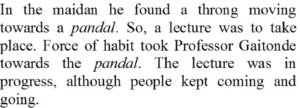

| Word | Meaning |
| Throng | Crowd |
| Force of habit | Because of habit |
In the Azad Maidan there was a large pandal. Many people were going towards it. Because of his habit Professor Gaitonde also followed the crowd. At the pandal he noticed that a lecture was in progress. People were coming to pandal and also going from pandal.


| Word | Meaning |
| Mesmerized | Fascinated, Deeply affected |
Prof Gaitonde was not looking at audience. All of his attention was towards the platform. He continued to look at it. There was a table and a chair on it. But nobody was sitting on the chair.


| Word | Meaning |
| Presidential | For the head of the function |
| Stirred | Affected, |
| Swiftly | Quickly |
He was surprised that the chair for the head of the function was empty. This scene affected him deeply. He quickly started moving towards the chair. It was as if a piece of iron was getting pulled by a magnet. And he sat on the chair.
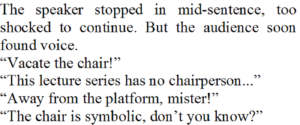

| Word | Meaning |
| Vacate | To empty |
The speaker stopped speaking in middle of a sentence. He was so shocked that he could not speak. But the audience started shouting. They asked Professor to move away from the chair. They told him that this series of lectures does not have a chairperson. The chair has been put as a mark of symbol only.
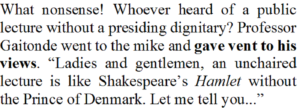

| Word | Meaning |
| Presiding | Heading a function or a meeting |
| Dignitary | Important person, VIP |
| Gave vent to | Expressed his emotions |
He thought that nobody can ever think of a public lecture without somebody being a head of gathering. Professor Gaitonde went to the mike and started expressing his emotions. He told that lecture without a president is like an act without its main character. He gave example of Shakespeare’s helmet without the prince of Denmark.


But the audience did not want to listen to him. They requested Professor not to give them any advice. They had become bored because of comments from the chairperson, vote of thanks and long introductions.


| Word | Meaning |
| Abolish | Stop, End, Delete |
The crowd said that they wanted to listen to the speaker. We have stopped old practices long ago. They asked him to vacate the platform.


| Word | Meaning |
| Hostile | Aggressive |
But Gangadharpant had spoken at 999 meetings before this. He had faced most aggressive audience at Pune. So he continued his talk.


| Word | Meaning |
| Valiantly | Bravely |
| Sacrilege | Sin, Bad practice |
| Swarmed | Gathered |
| Eject | Throw, |
Very soon crowd started throwing tomatoes, eggs and other objects at him. But he continued to speak bravely. He wanted to correct the bad practice. Finally audience climbed on the platform. They lifted him and threw him out of the platform.


After that Gangadharpant could not be seen in the crowd. He had gone out of Azad Maidan.
____


It is the only thing I want to tell Rajendra. The only thing I remember is that I had gone to Azad Maidan in the morning. But now I am back to the world I know. Where was I during those two days, while I was away from this world.


| Word | Meaning |
| Dumbfounded | Surprised, Astonished |
Rajendra was astonished by the description given by the professor. He took some to time to reply. Rajendra asked professor what was he doing just before he collided with the truck.


| Word | Meaning |
| Catastrophe | Destruction |
| Implications | Consequence, Result, Effect |
Professor replied that he was thinking about the theory of destruction and its effect for the history. Rajendra smiled and said that he had a doubt that professor was thinking something like that.


| Word | Meaning |
| Smugly | With excessive pride, |
| Running amok | To behave without any control |
Professor told Rajendra not to smile so proudly. If you understood that I was thinking about something naughty or behaving without any control on myself, please have a look at this.


| Word | Meaning |
| Triumphantly | Having a sense of victory |
| Vital | Important |
With a sense of victory, Professor Gaitonde took out a page from his pocket. It had been torn from a book. He thought that it was an important proof.


| Word | Meaning |
| Grave | Serious |
| Visibly moved | Clearly affected |
Rajendra read the words printed on that paper. His expression on his face changed. Now he was not smiling. He had a serious expression. One could see that he was affected.


| Word | Meaning |
| Pressed home his advantage | Tried to take more advantage he already had |
| Inadvertently | Unintentionally |
Now professor Gaitonde tried to increase his advantage. He said that he had unintentionally taken the Bakhar in his pocket while leaving the library. He came to know about his mistake while he was making payment for his food.


| Word | Meaning |
| Intended | Wanted |
Professor said that he wanted to return the book to the library in the morning. But in the crowd of the Azad Maidan he lost the book. Now he had only a torn-off page of the book. Fortunately the page has an important proof.


| Word | Meaning |
| Omen | Good indication, Lucky |
| Turn the tide in their favour | Covert the situation to their advantage |
Rajendra once again read the page. It narrated how Vishwasrao marginally escaped from the bullet. Marathas took this incident as a fortunate event. They converted the situation to their advantage.




At that situation Vishwasrao guided his horse into the crowd of special soldiers of enemy. He attacked them. And then God showed his anger. A bullet hit Vishwasrao and he died.


| Word | Meaning |
| Food for thought | A topic for thinking over |
| Fantasy | Imagination |
Rajendra told Professor Gaitonde that he had given a topic to think over. Before seeing this proof, I was thinking that your experience was an imagination. Now I have understood that truth can be more strange than imagination.


Professor Gaitonde asked what the facts were. He was very eager to know the facts.
____
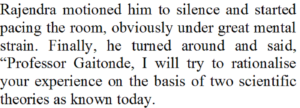

| Word | Meaning |
| Motioned | Signalled |
| Pacing | Moving, Walking |
| Rationalise | Explain |
Rajendra signaled Professor Gaitonde to remain silent. He started walking in the room. He was under severe mental tension. He was trying to think something. Finally Rajendra looked at Professor and told that he would try to explain his experience on the basis two theories of science.


| Word | Meaning |
| Convince | To satisfy, To agree, To assure |
Whether I could convince you or not can be judged only by you. Because you have certainly had a fantastic experience. Actually it was a destructive experience.


| Word | Meaning |
| I am all ears | I am carefully listening |
Professor Gaitonde told Rajendra that he was carefully listening. He further requested Rajendra to continue to speak. Rajendra spoke while he was walking.


Rajendra told Professor that he must have heard about the theory of destruction at seminars. Lets us apply it to the Battle of Panipat. Sometimes soldiers directly fight facing each other in an open ground. That is an excellent situation to apply the theory of destruction.


| Word | Meaning |
| Disparity | Difference |
| Troop | Group of soldiers |
| Armour | Military equipment |
| Comparable | Similar |
Maratha army was fighting a battle with army of Abdali on the field of Panipat. The soldiers were not very much different from each other – they were equally strong. Equipment of two armies were also similar.


| Word | Meaning |
| Morale | Motivation, Confidence |
| Juncture | Time, Point, Moment |
| Turning point | Time of change, Point of change |
Therefore victory was mainly dependent upon quality of leaders and motivation of soldiers. The point of change in the war was killing of Vishwasrao. He was the son of Peshwa and the heir to the throne of Maratha empire.


According to books of history, his uncle Bhausaheb quickly came to the place where Vishwasrao was fighting. And he was never seen again. Nobody was sure if he was killed in the battle or remained alive.


| Word | Meaning |
| Blow | Shock |
| Crucial | Important, Critical |
| Utter | Complete |
| Rout | Defeat |
But for the soldiers, the shock of losing their two leaders was very important and critical. Now they did not have the motivation so did not have the desire to fight. Therefore they were completely defeated.
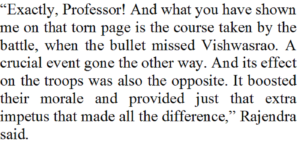

| Word | Meaning |
| Impetus | Energy, Momentum, Encouragement |
And professor, through that torn page of the book, you are showing me outcome of the battle after the bullet did not hit Vishwasrao. This event had another important effect. The effect on the troops was opposite – they were now motivated. It provided additional energy and encouragement to soldiers. This made a big difference. It was explained by Rajendra.
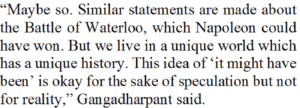

| Word | Meaning |
| Speculation | Imagination |
| Sake of speculation | For imagination only |
Gangadharpant said that probably it was true. Similar things have been told about the Battle of Waterloo. It is said that Napolean could have won that battle. But our world has a unique history. The thought of “what could have happened” is imagination. It is not the reality.


| Word | Meaning |
| I take issue with | To disagree |
Rajendra told that he did not agree with Gangadharpant. He wants to explain his second point. This could be strange to Gangadharpant. Rajendra requested him to listen to it.
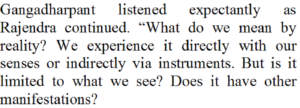

| Word | Meaning |
| Expectantly | Eagerly in the hope of something good |
| Manifestation | Sign, Indication |
Gangadharpant eagerly listened to Rajendra. Rajendra said that one should understand the meaning of reality. We directly feel it or we measure it through instruments. But the reality is limited to what can be seen. He asked Gangadharpant if reality has any other indication.
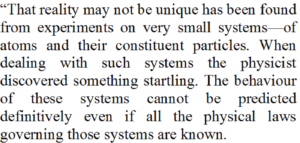

| Word | Meaning |
| Constituent | Parts |
| Physicist | Scientist in Physics |
| Startling | Amazing, Surprising |
| Difinitively | Accurately |
Through experiments on atoms and their parts it has been found that reality may not be unique. While understanding such systems scientists have discovered something surprising. The behavior of atomic system can not be fully predicted by rules known to mankind.
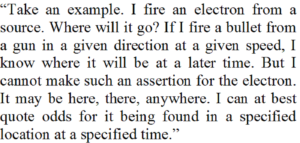

| Word | Meaning |
| Assertion | Assessment, Prediction |
For example if I fire an electron from a source, I do not know where will it go. If I fire a bullet from a gun in certain direction and at certain speed, I can predict its movement. But I cannot make such assessment for an electron. At the most, I can tell the probability of electron being at certain location at certain time.


| Word | Meaning |
| Lack | Shortage, Scarcity, Limitation |
| Ignoramus | Ignorant, Stupid |
Professor Gaitonde said that it is because quantum theory cannot explain everything. It has limitation. An ignorant historian like me also knows about this limitation.
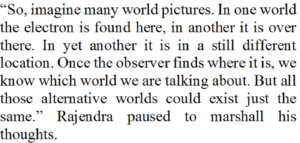

| Word | Meaning |
| Marshal | Gather, Compile |
Rajendra said that hence there are many possibilities to same situation. In each possibility electron can be at different location. When we see the electron, then we are able to understand which situation we have been talking about. Each situation can be called a world. Rajendra stopped to compile his thoughts.


| Word | Meaning |
| Interjected | Intervened, Interfered |
Professor Gaitonde asked Rajendra if these different worlds were connected to each other. Rajendra replied it is yes and no both. Imagine an electron is circling the nucleus of an atom. Gangadharpant intervened and said just like a planet revolves around the Sun.


| Word | Meaning |
| Precise | Accurate |
| Trajectory | Path of movement |
Rajendra replied that it is not true. We know the exact path of movement of planets. But electron can revolve in any of the many orbits during a specific condition. These conditions can be considered as different situations prevailing in the world.




| Word | Meaning |
| Transition | Change |
| Microscopic | Very small |
| Macroscopic level | Large scale |
Or it may receive some energy and move from state 2 to state 1. Such changes are very common in case of smaller systems. Rajendra asked what would happen if such changes started happening at a large scale.


Gangadharan asked a question to Rajendra. Have I moved from one world to another world and then back to first world from second world?
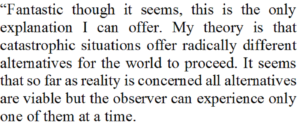

| Word | Meaning |
| Radically different | Entirely different |
| Alternatives | Options |
| Viable | Possible |
This may appear a fantastic explanation to you, But this is the only explanation I can make. Destructive situations offer entirely different possibilities to the world to move ahead. It may appear to a person that all options are possible. But an observer would see only one option at a time.


By making movement you experienced two worlds one by one.. First world is where you are living now and the second world is where you were for two days. One world believes in the history we know and the second world believes in a different history.


| Word | Meaning |
| Bifurcation | Dividing into two |
The separation of the two world had occurred while you were reading about Battle of Panipat. You did not travel anywhere. You remained in the present but you experienced two different worlds.


| Word | Meaning |
| By the same token | According to same logic |
By the same logic, there must certainly be many more different worlds. These will emerge because of division at different point of time.


Rajendra completed his talk. A question has been bothering Gangadharapant from the beginning. So he asked Rajendra why he had travelled to different world.


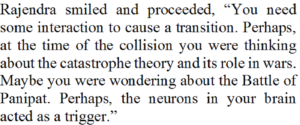

Rejendra smiled and continued to speak. You need an interaction to make that change. Probably when you collided with a truck, you were thinking about the theory of destruction. Probably you were thinking about Battle of Panipat. So a part of your brain provided the change from one world to other.


Professor Gaitonde told Rajendra that it was a good guess – meaning that it was true. I was really thinking how history could have been different if the Battle of Panipat was won by Marathas. He further told that such situation would be the topic of his next speech as a chairperson of a lecture. This would be his 1000th speech.


| Word | Meaning |
| Recount | Recall, Remember |
| Speculate | Imagine |
| Grave | Sad |
Rajendra laughed. He told Gangadharpant that now he could understand his real life experience. There was no need for him to imagine anything. But Gangadharpant was sad.
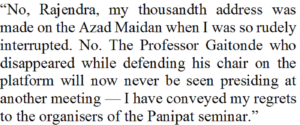

| Word | Meaning |
| Interrupt | Stop, |
Gangadharpant told Rajendra that his 100th address was made at Azad Maidan. His speech was rudely stopped. Professor Gaitonde had left the platform while he was still giving his speech. He decided that he will not give any more speech. So he conveyed his unwillingness to the organizers of Panipat seminar.
****




0 Comments